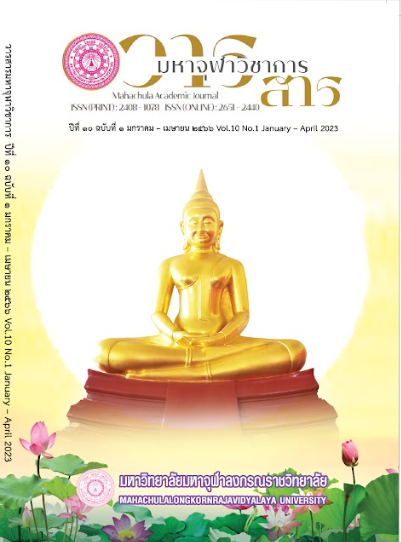The Guidelines for Food Consumption for Peacebuilding Based on Buddhism
Main Article Content
Abstract
The dissertation entitled “The Guidelines for Food Consumption for Peacebuilding Based on Buddhism” consisted of the following objectives: (1) to investigate food consumption in Buddhism and modern science; (2) to explore food consumption for peacebuilding according to Buddhism and modern science; and (3) to propose the guidelines for food consumption for peacebuilding based on Buddhism. The study employed a documentary research technique with data being obtained from the Tipiṭaka, commentaries, and related documents. The obtained data were analyzed logically and presented in a descriptive method.
From the study, it has been discovered that the never-ending search for food for consumption is the source of mental suffering, sicknesses, and other problems. Buddhist virtues are used to control cravings both physically and mentally, but modern science employs social tradition for governance and laws to manage people's demands in society. This leads to collaboration between religion and the state in fostering harmony in society and protecting personal property rights, resulting in people coexisting peacefully. Food consumption for Buddhist peacebuilding begins with self-development, which is to seek food based on Sammā-ājīva (right means of livelihood) and consume food thoughtfully. Monks rely on effort to attain the Noble Eightfold Path while laypeople should observe the precepts to support themselves and their families. Food consumption for peacebuilding according to modern science relies on the collaboration of world society under the laws that everyone agrees on and that are just, equal, respect the rights and liberty. This attempts to reduce various conflicts and develop everyone to have a job that pays well enough and keeps them out of poverty. The body of knowledge from the study "The Guidelines for Food Consumption for Peacebuilding Based on Buddhism" is a 'consideration - moderation - kindness - equanimity' model made up of three parts: Dhamma principles, practices, and outcomes. The model is based on the 4 Dhamma principles which are: (1) Yonisomanasikāra refers to proper consideration in obtaining an honest occupation and consume by considering the genuine values; (2) Bhojane-mataññutā refers to moderation in eating and suitable for the body; (3) Mettā refers to loving-kindness and non-hatred for oneself and others, sharing and helping one another; and (4) Upekkhā refers to equanimity, training one's mind to let go and be selfless. All 4 principles can be applied to the food search process, food consuming process, food preparation process, and mental development process, collectively known as the '4 practices.' This will result in peace for oneself, family, community or society, and nature, referred to as the "4 outcomes."
Article Details

This work is licensed under a Creative Commons Attribution-NonCommercial-NoDerivatives 4.0 International License.
References
พระเจ้าบรมวงศ์เธอ กรมพระจันทบุรีนฤนาถ. ปทานุกรม บาลี ไทย อังกฤษ สันสกฤต. นครปฐม: โรงพิมพ์มหามกุฏราชวิทยาลัย, ๒๕๕๓.
พระพรหมคุณาภรณ์ (ป. อ. ปยุตฺโต). พจนานุกรมพุทธศาสน์ ฉบับประมวลศัพท์. กรุงเทพมหานคร: บริษัท ธนธัชการพิมพ์ จำกัด, ๒๕๕๓.
พระมหาโพธิวงศาจารย์ (ทองดี สุรเตโช). ศัพท์วิเคราะห์. กรุงเทพมหานคร: เลี่ยงเชียง, ๒๕๕๘.
มหาจุฬาลงกรณราชวิทยาลัย. พระไตรปิฎกภาษาบาลี ฉบับมหาจุฬาเตปิฏกํ ๒๕๐๐. กรุงเทพมหานคร: โรงพิมพ์มหาจุฬาลงกรณราชวิทยาลัย, ๒๕๓๕.
_________. พระไตรปิฎกภาษาไทย ฉบับมหาจุฬาลงกรณราชวิทยาลัย. กรุงเทพมหานคร: โรงพิมพ์มหาจุฬาลงกรณราชวิทยาลัย, ๒๕๓๙.
มหาวิทยาลัยมหาจุฬาลงกรณราชวิทยาลัย. อรรถกถาภาษาไทย ฉบับมหาจุฬาลงกรณราชวิทยาลัย มัชฌิมนิกาย มัชฌิมปัณณาสก์ ปปัจจสูทนี. กรุงเทพมหานคร: โรงพิมพ์มหาจุฬาลงกรณราชวิทยาลัย, ๒๕๕๒.
_________. อรรถกถาภาษาไทย ฉบับมหาจุฬาลงกรณราชวิทยาลัย อังคุตตรนิกาย เอกกนิบาต มโนรถปูรณี ภาค ๑. กรุงเทพมหานคร: โรงพิมพ์มหาจุฬาลงกรณราชวิทยาลัย, ๒๕๕๓.
_________. อรรถกถาภาษาไทย ฉบับมหาจุฬาลงกรณราชวิทยาลัย ขุททกนิกาย มหานิเทส. กรุงเทพมหานคร: โรงพิมพ์มหาจุฬาลงกรณราชวิทยาลัย, ๒๕๕๙.


